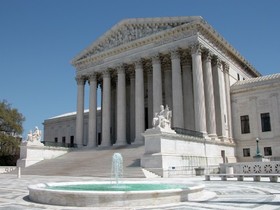It's kind of tough translating a 200+ year old document like the Constitution to modern-day technology. Conservatives would rather we don't do it at all, sticking to the letter of the document (i.e., "if the Constitution was silent about privacy, then privacy is not protected").
But once in a while, the Supreme Court gets it right:
The Supreme Court ruled unanimously Monday the authorities need a probable-cause warrant from a judge to affix a GPS device to a vehicle and monitor its every move.
The decision (.pdf) in what is arguably the biggest Fourth Amendment case in the computer age, rejected the Obama administration’s position. The government had told the high court that it could affix GPS devices on the vehicles of all members of the Supreme Court, without a warrant.
“We hold that the government’s installation of a GPS device on a target’s vehicle, and its use of that device to monitor the vehicle’s movements, constitutes a ‘search,’” Justice Antonin Scalia wrote.
In a footnote, Scalia added that, “Whatever new methods of investigation may be devised, our task, at a minimum, is to decide whether the action in question would have constituted a ‘search’ within the original meaning of the Fourth Amendment. Where, as here, the government obtains information by physically intruding on a constitutionally protected area, such a search has undoubtedly occurred.”
In all, five justices said physically attaching the GPS device to the underside of a car amounted to trespassing and was a search requiring a warrant. The majority said “the present case does not require us to answer” whether police may employ GPS monitoring of a vehicle via an already onboard navigation system “without an accompanying trespass.”
Four justices, however, said the prolonged GPS surveillance in this case — a month — amounted to a search requiring a warrant. But the minority opinion was silent on whether GPS monitoring for shorter periods would require a warrant.
Full opinion (PDF) here.
UPDATE: Some law geekiness is required here.
The Fourth Amendment protects against unreasonable searches without a warrant. The exact holding of the case above is being wildly misreported. The majority does not say that attaching a GPS device to the underside of a car is an unreasonable search, only that it is a "search" for Fourth Amendment purposes. Specifically, five justices — Scalia, Roberts, Kennedy, Thomas, and Sotomayor — said the device constituted a search of private property. Four justices — Alito, Ginsburg, Breyer, and Kagan — focused on reasonable expectations of privacy.
Strange goings-on with Sotomayor and Alito being in the places you wouldn't expect them to be.

